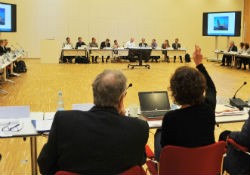Expert advisory group supports implementation of the European Vaccine Action Plan

WHO
WHO/Europe sought expert guidance on the control of vaccine-preventable diseases in the European Region from the European Technical Advisory Group of Experts on Immunization (ETAGE) at the Group’s 14th meeting on 8-9 September 2014 in Copenhagen, Denmark.
By monitoring progress, reviewing approaches and driving momentum on some issues, ETAGE plays a pivotal role in the work of the Vaccine-preventable Diseases and Immunization programme (VPI). In the coming years, this guidance will support implementation of the European Vaccine Action Plan 2015-2020 (EVAP), which was adopted by all Member States in September 2014. As stated by the Group’s chair, Pierre van Damme: “The collaborative process in which EVAP was developed and its unanimous endorsement by Member States has created broad ownership of its objectives. It is now the responsibility of all of us to implement its mandate.”
Progress and ongoing challenges
While applauding progress achieved over the past year in some areas, such as introduction of new vaccines and establishment of additional national immunization advisory groups (NITAGs) (now present in 43 out of 53 countries), ETAGE also voiced concern about:
- ongoing outbreaks of measles and rubella that threaten the 2015 elimination target for the Region;
- persistent immunity gaps in some population groups; and
- inconsistent quality and availability of disease surveillance data.
Advice based on the collective expertise of ETAGE members is especially useful in refining WHO/Europe’s response to these challenges.
Hepatitis B
Among EVAP’s goals is the control of hepatitis B infection in the European Region. Morbidity of this disease and current efforts to control it vary widely across the 53 Member States. Within this complex context and with ETAGE guidance, a working group of immunization experts has taken initial steps towards establishment of a regional goal for hepatitis B control.
Pertussis
In light of the resurgence of pertussis in some countries in recent years, a global working group on pertussis was established in 2013 by the Stategic Advisory Group of Experts on Immunization (SAGE). The working group’s findings were presented to ETAGE, including countries’ options in choosing control strategies appropriate to their contexts. A fully updated SAGE position paper will be published in early 2015.
Further topics
Other pressing issues discussed at the ETAGE meeting included:
- progress in introduction of inactivated polio vaccine (IPV) and planning for the transition from trivalent to bivalent oral polio vaccine (OPV), both as part of the Polio Endgame Strategy;
- upcoming introduction of human papillomavirus (HPV), rotavirus and pneumococcal (PCV) vaccines into the national immunization schedules of various Member States;
- further establishment and capacity building of NITAGs;
- further roll-out and evaluation of the Tailoring Immunization Programmes (TIP) approach to reach underserved populations;
- developing strategies for adult immunization;
- data collection, reporting and management at all administrative levels;
- addressing vaccine hesitancy;
- response to the Ebola crisis and potential availability of an Ebola vaccine.
Makeup and objectives of ETAGE
The 8-member ETAGE gives guidance to WHO/Europe and Member States on immunization-related activities and developments in the European Region. Each year in October, in Copenhagen, Denmark, it receives WHO/Europe’s reports on vaccine-preventable diseases and immunization activities in the Region.
In light of the approaching target for elimination of measles and rubella and to devote more time to specific pressing issues such as establishment of a hepatitis B target and improving data quality, an extraordinary meeting of ETAGE is planned for January 2015.
Other participants actively involved in the discussions were representatives of partner organizations (the European Centre for Disease Prevention and Control, the European Commission, GAVI Alliance, the SIVAC Initiative, the United Nations Children’s Fund), SAGE and NITAGs from Albania, Armenia, Azerbaijan, Gerogia, Romania, the former Yugoslav Republic of Macedonia and Ukraine.



